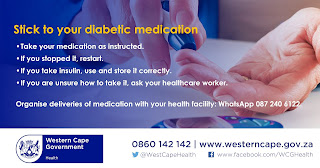Persons living with diabetes are at risk of severe COVID-19 if they become infected.
According to the Western Cape’s Health
Department, the severity of COVID-19 is tripled in the diabetes community.
Persons who have poor glucose control (fasting
blood glucose >7.8 mmol/L, HbA1c>7%)) are particularly at risk.
Tygerberg and Groote Schuur Hospitals are
urging people with diabetes to seek care without delay if COVID-19 is
suspected.
Those with diabetes who qualify for the
COVID-19 vaccine are encouraged to get it.
Diabetes is a lifelong condition that affects
how the body gets energy from food, resulting in too much sugar in the blood if
diabetes medication is not used and if lifestyle changes are not made. High blood sugar causes havoc in the body
leading to high blood pressure, strokes, heart attacks, kidney failure,
blindness and amputations – all of which can be prevented with good blood sugar
control and healthy living.
According to the International Diabetes
Federation, 463 million people have diabetes in the world and about 4.5 million
in South Africa (12.8% of our population). Experts are of the opinion that this
is a gross underestimation, and it is believed that 3 out of 5 South-Africans
with diabetes are not yet diagnosed. You may have diabetes without knowing it
if you are overweight, inactive, older than 45 years are/ or if you have a
strong family history. Thus, it is of utter importance to visit your healthcare
facility if you are at risk and not to wait until you have symptoms of
diabetes.
A total of 40% of all COVID-19 admissions to
Groote Schuur Hospital have been persons living with diabetes, according to
Prof Joel Dave, Head of the Division of Endocrinology at Groote Schuur
Hospital. “Persons living with diabetes are usually older and obese, and age
and obesity is a major risk factor for more severe COVID. It is very important
to control diabetes to prevent complications. Medication, lifestyle choices and
following COVID protection measures are all essential for this.”
Dr Ankia Coetzee, an endocrinologist at
Tygerberg Hospital, encourages persons to take care of their diabetes at home
by looking after their feet to prevent ulcers and trying to lose weight if they
can.
“It is important that they check their glucose
regularly and discuss it with their healthcare worker if it is over 10mmol/L or
under 4mmol/L on finger prick. It is advisable to increase the frequency of
your blood glucose fingerprick testing if you feel unwell and/or have
COVID-19.”
Contact your healthcare facility if:
• Immediately
o You
have low blood sugar (finger prick glucose <4mmol/L and/or symptoms of
hypoglycemia if you don’t have a glucometer) that does not improve or occurs
more than once.
o You
need assistance to recover from an episode of low blood sugar.
o Your
blood sugar exceeds 13.8 mmol/L and you feel unwell.
o You
start vomiting and/or have fast breathing (it can indicate a hyperglycemic
emergency).
• Urgently
o You
have a sore on your foot.
o You
need help with taking or getting your medication.
o You
have an appointment for a check-up.
WhatsApp 081 578 6636 for more diabetes
information and support.
Take care of yourself and stay safe this
winter.
Info: Western Cape Government: Health
Done By: Mitchum George

Comments